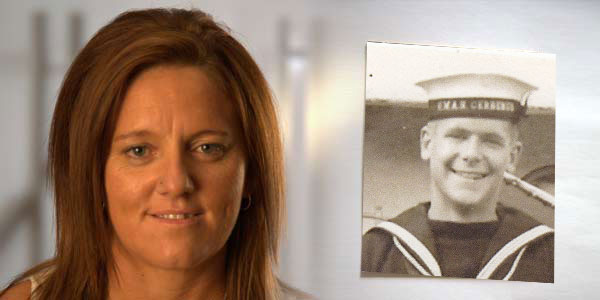In Their Footsteps hits the ground running
 Thursday, May 12, 2011 at 12:55PM
Thursday, May 12, 2011 at 12:55PM 
In Their Footsteps premiered last Sunday on the Nine Network at 6.30pm with an outstanding ratings performance against very strong opposition.
Despite facing a two-and-a-half hour special of Dancing With the Stars, Footsteps pulled over a million viewers and ended as the day’s fifth-ranked program overall, eclipsing 60 Minutes, Merlin, Blood Brothers and Hawaii Five-O
The first episode featured the remarkable story of Tommy Johnson, one of the survivors of the sinking of the HMAS Perth.
Perth Mum, Julie Bryce, had grown up with the photo of her great uncle, a handsome, smiling sailor, but never knew what happened to him. Last Sunday she took us with her as she embarked on an emotional quest to find out what happened to Tommy after the Perth went down in early 1942, taking 353 of his shipmates to the bottom with it.
Tommy and a handful of his mates survived the sinking but they were picked up by Japanese ships and forced to endure the nightmare of the Thai-Burma Railway. When the railway was completed Tommy and his pals were crammed on board one of the ‘hellships’, rusting transports used to take POWs to work as slave labour in Japan.
Once again, Tommy’s ship was torpedoed, this time by an American sub, which mistook it for a Japanese troopship. Once again, Tommy and his mates survived, only to be rescued by the Japanese and taken to Tokyo.
Julie Bryce follows Tommy to the site of the Burma Railway in Thailand, where she walks part of the melancholy trail of death, she visits the site of the Perth’s sinking and lays a wreath, and finally she takes us to Tokyo for the conclusion of her journey of discovery.
Julie hears Tommy’s story through the eyes of one of his best mates, still alive in his 90s. She learns the remarkable sacrifices made by her great uncle and her life is changed by her quest. We are all enriched by following in Tommy Johnson’s footsteps.
This Sunday, we travel to Malta for Tony Boyd’s story. He was one of the bravest of the brave, a fighter pilot in the Battle of Malta in WWII.